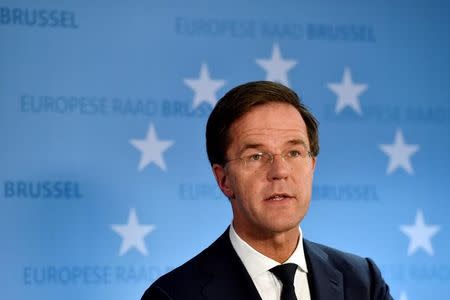Warning of Russia, Dutch PM confident on Ukraine deal

By Natalia Zinets and Stephanie van den Berg KIEV/THE HAGUE (Reuters) - Dutch Prime Minister Mark Rutte said he was confident parliament would approve a European Union compromise designed to rescue a cooperation accord between Ukraine and the bloc after Dutch voters rejected it in a referendum. Kiev and most EU capitals see the association agreement as crucial support for Ukraine against a Russia that is playing an assertive foreign policy role across Europe and the Middle East. EU leaders agreed on Thursday to spell out limits to the agreement to address concerns expressed by Dutch voters in an advisory referendum in April this year. The leaders agreed it did not make Ukraine a candidate for EU membership, and did not entitle Kiev to financial aid or military assistance. Neither did it give Ukrainians the right to live and work in the 28-nation union. "The situation with Russia is getting ever more confrontational," Rutte told a news conference on Friday. "That is a direct threat to our stability." Highlighting Russia's occupation of parts of Ukraine, hacking attacks against Western governments and political parties and Russia's support for Syria's government in its civil war, he said it was important to assuage Dutch voter concerns without "conceding to Russia". Ukraine's President Petro Poroshenko welcomed the EU leaders' compromise, saying in a social media post that it was a "necessary step" towards securing the agreement. RUSSIAN SECURITY THREAT The Netherlands is the only EU country that has yet to ratify the deal, which would become void without its endorsement. Rutte said he was confident of winning a majority for the compromise in both houses of parliament, though he conceded it might take until after parliamentary elections due on March 15. Rutte's party faces competition from more anti-European parties that say the Ukraine deal must be dropped following the referendum vote. But Rutte said the Russian security threat outweighed the threat to his popularity in his calculations. Ukraine considers the agreement a symbol of its future direction, 25 years after the collapse of the Soviet Union. A pro-Russian president in Kiev was toppled by street protests in 2014 after he tried to ditch the EU accord in favour of a deal with Moscow. Russia responded by annexing Ukraine's peninsula of Crimea and went on to back a separatist rebellion in eastern Ukraine, a conflict that has killed nearly 10,000 people to date. (Reporting by Natalia Zinets in Kiev and Stephanie van den Berg in The Hague, writing by Thomas Escritt, Editing by Angus MacSwan)

